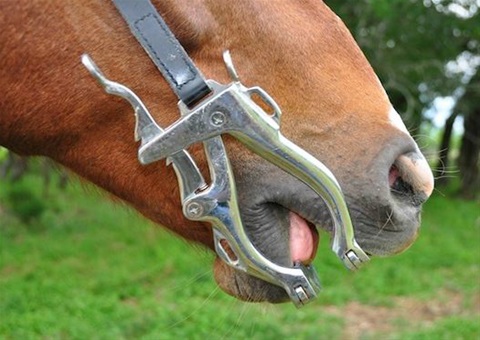Equine Dentistry - 4 reasons for regular dental care:
- Improved horse health and comfort and help in maintaining ideal weight
- Improved horse performance
- Improved feed efficiency with a reduction in horse feed costs.
- Reduction or elimination of behaviours that compromise horse and care taker safety such as rearing, resisting the bit, and head shaking.
In addition, a foal should have its mouth examined in the first week of life for proper jaw alignment and incisor placement.
A horse's upper jaw is wider than his lower jaw. Consequently, the outside edges of the top teeth and the inside edges of the lower teeth do not get worn down in the same way and they tend to develop sharp points. These sharp enamel points can make it difficult for horses to properly chew their food. This leads to large particles of unchewed hay or forage in the digestive tract and causes the horse to be at risk for impaction colic.
The sharp enamel points also cause sores in the horse's mouth and allow bacteria and toxins to enter the horse's bloodstream. The sores result in behavioural problems, especially when a bit is placed in the horse's mouth.
Fractured teeth, teeth with exposed pulp cavities, periodontal disease and abscesses are other common equine dental problems.
During his life time, the horse’s teeth, unlike ours, are continually erupting as the portion of the tooth that is in the socket becomes the visible portion as it erupts. As the tooth erupts, its comes into occlusion or contact with the tooth it opposes. This intimate relation between opposing teeth is what allows horses to masticate and digest forage such as grass and alfalfa.
Throughout the horse's life span, teeth will naturally wear down; during this dynamic process both normal and abnormal wear patterns can occur. The result can be either pain or premature wear out of the teeth. It is this finite life span of the teeth and the discomfort that can result from even regular wear patterns that makes annual dental exams important for the horse.
